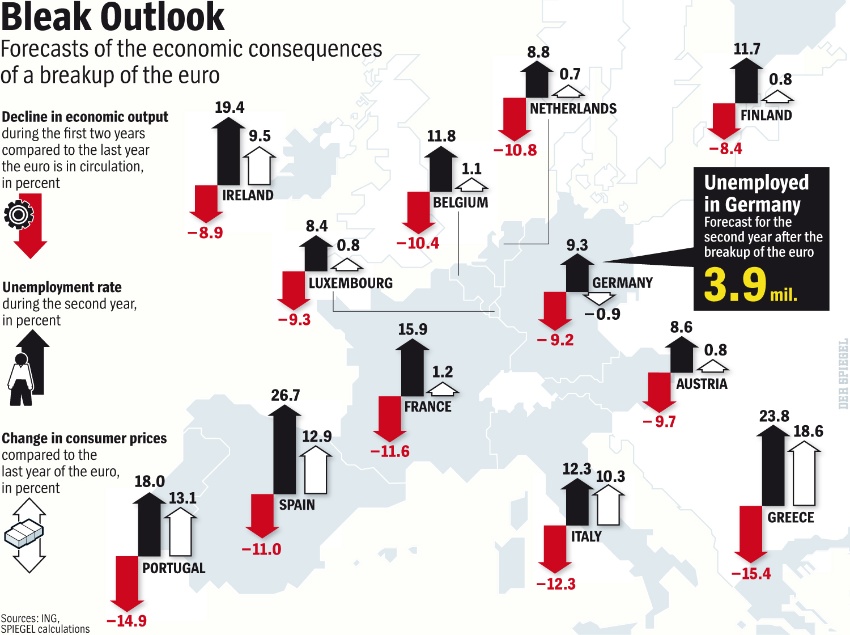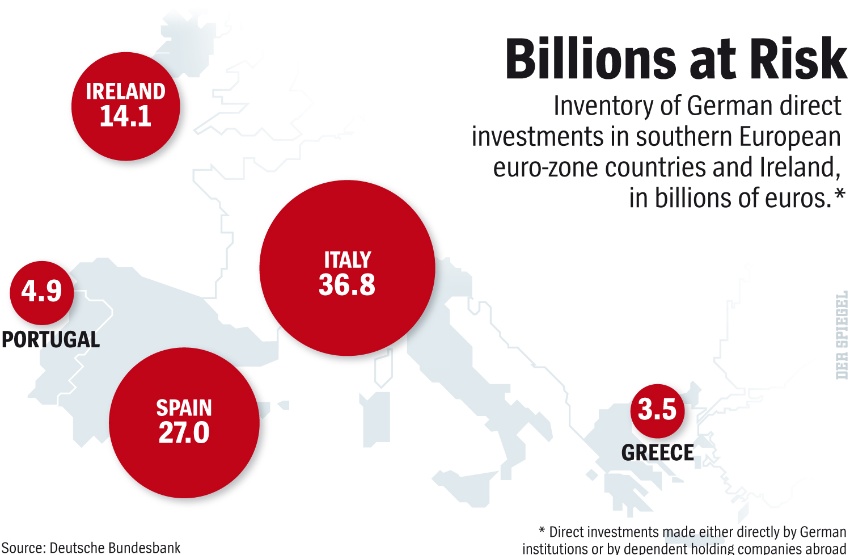“The euro is in trouble and only Germany can fix it.” That’s the meme—and the fear—described in a recent Spiegel Online piece.
Much of the euro zone and EU “leadership” is pushing for a “bank union,” a “debt repayment fund,” a communalization of (southern Europe) debt across Europe in the form of euro bonds. Without one or more of these, goes the plaint, there is no way to stop the debt crisis.
But these worthies make no coherent case for why the taxpayers of one country should be held liable for the debts of other countries’ governments—or of other countries’ private institutions. Indeed, this amortization across the sound and responsible can only damage, if not break, the sound and responsible economies and create an enormous moral hazard by indemnifying the irresponsible from the consequences of their profligacy. This indemnification can only encourage yet more of the same.
Subsidizing anything only produces more of that thing, without making it any more accessible to the originally targeted population, and the schemes above only subsidize borrowing. This is the way to prolong the debt crisis, it is not a solution to it. These proposals do not even pretend to an imposition of fiscal discipline, either from within the fiscally irresponsible nations themselves or from without by the sound nations withholding further lending. The courses proposed will only have the effect of punishing the sound for their soundness and they will reduce those sound nations’ own willingness (much less their ability) to maintain their own fiscal responsibility.
If euro bonds were introduced, goes one claim, countries like Italy and Portugal could take on large amounts of new debt without having to fear effective monitoring of their government spending. Yet this is an aspect of moral hazard. Jens Weidmann, President of the Deutche Bundesbank, the German central bank, points out that if debts were shared, “liability and control would have to be in conformity with one another.” Indeed. But if such unity were achieved, the empirical evidence demonstrates that it would be by loosening the discipline of the responsible countries, the direct opposite of the needed outcome. The profligate borrowers, bailouts in hand, will have no incentive to mend their own ways, to seek discipline.
Italy, for instance, has a debt-to-GDP ratio of 120 percent. The proposed courses of action would mean that Rome could transfer a significant fraction of its debt to a shared euro debt fund, for instance. The Italians thus would have even less incentive to introduce necessary structural reforms. There’s that moral hazard.
For all this, Sabine Lautenschläger, Vice President of the Deutche Bundesbank, points out that when there is a crisis in a national banking system, “it may be necessary to use the money of taxpayers in other countries.” This is moral hazard carried to the point of naked freeloading. “I exist, and you have money. Therefore, you owe me.”
The matter is emphasized by the current bailout of Spanish banks, long resisted by Prime Minister Mariano Rajoy, and the market’s recognition of the failure of such a thing: following news of the loaning of €100 billion ($126 billion) to Spain’s larger banks, the financial markets pushed Spanish borrowing costs to recent year record levels. And of course the markets reacted badly: they correctly recognized this as simply adding debt to a debtor who has said he’s unable to repay existing debt. Rajoy was correct to resist the bailout for as long as he did, and he was wrong finally to accept it. He has only increased the danger to Spain.
That’s the moral hazard; now we get the Chicken Little act: “senior officials” in Berlin are openly discussing the possibility that the euro could fall apart, and Christine Lagarde, Managing Director of the International Monetary Fund, insists with a straight face that there remain only “three months” to save the euro. A senior euro-zone diplomat in Brussels bleats, “If Germany doesn’t make a move, Europe is dead.”
There’s more: Germany already has billions of euros invested in preserving the currency zone says Spiegel. And so they must pony up yet more, or lose the sunk investment. This, though, is the amateur investor’s error: being married to a failed position. Insisting on holding to that failure, even adding money to it, in the hope that the investment will, eventually, finally, turn around and the losses be recouped is a fool’s hope. In reality, the losses continue to mount as the failure deepens, and the final bankruptcy is that much more expensive, because the amateur investor will have lost that much more. The best move for a failed investment is to cut the losses by terminating the investment, painful as that may be. So it is with the nations’ sovereign debt. Cut the losses. They’ve already demonstrated they cannot repay—adding to their debt burden only makes their inevitable bankruptcy that much more disastrous.
Yet the fear of dissolution is both unfounded and misdirected. After the inhomogeneity of social, political, money purpose imperatives of the euro zone nations, the next greatest risk to the euro is this moral hazard. Eliminating the moral hazard would strengthen the EU and the euro zone, not destroy it. Let the bankrupt go bankrupt, stop propping them up with more debt funded with OPM. Fiscal discipline—as the northern European countries, especially Germany, have demonstrated—is the road back, to the extent there is one, with that inhomogeneity barrier in the way.
Indeed, that inhomogeneity demonstrates another aspect of the crisis. Each PIIGS’ problem and situation is unique, beyond the general theme of irresponsible spending and borrowing. Each solution must be unique, beyond the general theme of no bailouts from outside.
As Churchill once said, these folks are killing the wrong pig.


